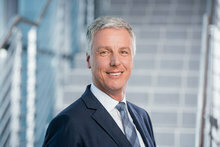The new high-efficiency gas turbines to be installed at the Wolfsburg power stations will durably reduce carbon dioxide emissions for heat and power generation by about 1.5 million tonnes per year. This corresponds to the current annual CO2 output of about 870,000 vehicles and represents a reduction of almost 60 percent compared with the previous emissions of the power stations at Wolfsburg. With reference to the German plants, the reduction in CO2 emissions amounts to about 50 percent. The systems are to be operated by Group company VW Kraftwerk GmbH.
"The Volkswagen Group intends to and indeed must make its contribution to combating climate change and improving air quality. This is why we are forging ahead with the electrification of our vehicles at the same time as making conventional powertrains cleaner and more efficient. We have also set ourselves new, ambitious targets for production. By 2025, we intend to reduce environmental impact throughout the Volkswagen Group by 45 percent (energy, CO2, water, solvents and waste) compared with 2010. The changeover of the two power stations at the company's headquarters in Wolfsburg from coal to gas is a clear signal in this context and an important step. Others will follow," said Matthias Müller, CEO of Volkswagen Aktiengesellschaft, following the decision by the Board of Management.
At the "Heizkraftwerk Nord/Süd" power station, a landmark of the Wolfsburg plant, it is planned to replace the coal-fired boilers by a combined-cycle (gas and steam turbine) system and three hot water boilers. In future, these facilities will generate about 136 megawatts of electric power and about 386 megawatts of heat energy. In addition, two further combined-cycle units are to be installed in the current coal storage area next to the "Heizkraftwerk West" power station and will then generate about 288 megawatts of electric power and about 265 megawatts of heat energy. The total investment in high-efficiency combined-cycle systems at this location will be about €400 million.
Provided that approval is given by the competent authorities and sufficient progress is achieved with detailed design and calls for tenders, the first construction work could already start in 2018. When the new facilities have been commissioned, probably in 2021 and 2022, CO2 emissions may be reduced by almost 60 percent or about 1.5 million tonnes per year – corresponding to the current carbon dioxide output of about 870,000 vehicles per year.
Michael Heinemann, Speaker of the Management Board of VW Kraftwerk GmbH, comments: "If synthetic natural gas becomes economically viable in the future, for example as a result of the use of power-to-gas systems, we could become entirely carbon-neutral. Within the context of the energy transition, this would represent a future-oriented supplement to renewable energies."
"However, the new facilities will not only reduce carbon dioxide emissions but will also drastically lower water consumption, waste volumes and other emissions – by an average of about 50 percent. This way, we also help to reduce local pollutant concentrations," explains Stephan Krinke, Head of Environmental Affairs of the Volkswagen Group.
The two power stations at Wolfsburg not only supply most of the power required for the Volkswagen Passenger Cars, Volkswagen Commercial Vehicles and Volkswagen components facilities at Wolfsburg, Emden, Hanover, Kassel, Brunswick and Salzgitter. The stations also supply heat to the Wolfsburg plant as well as to the city of Wolfsburg.
*Calculation: average mileage of passenger cars (gasoline+diesel+CNG) 14,100 [km/year]. EU fleet value 122 g/km. Source: mobility figures 2015/2016.
About VW Kraftwerk GmbH: VW Kraftwerk GmbH is a wholly-owned subsidiary of Volkswagen AG. VW Kraftwerk GmbH is responsible for the operation of power stations at Wolfsburg, Kassel, Brunswick, Hanover and Emden and has about 490 employees. In addition to the planning, design and operation of power stations and energy supply systems, the company's activities also include the distribution of energy to individual factory halls, power trading, the negotiation and conclusion of energy supply contracts for Group companies and various services for energy carried by pipeline and cable systems.







